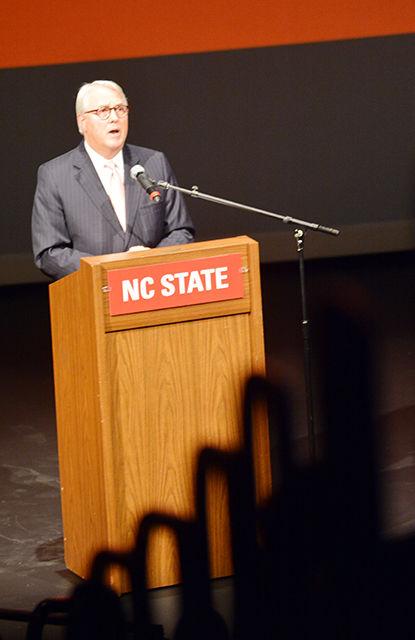The UNC Board of Governors approved salary raises ranging between 8 and 19 percent for Chancellor Randy Woodson and 11 other UNC System chancellors in November.
Woodson’s 13.46 percent raise will bring his base pay up $70,000 to $590,000, making him the highest paid UNC System chancellor. On top of this, Woodson has the ability to receive a yearly stipend of up to $200,000 paid for by the N.C. State University Foundation, a nonprofit foundation closely tied to NC State.
Payment of the stipend will depend on a recommendation from the Executive Committee within the Board of Trustees. The recommendation will be based on the board’s satisfaction with Woodson’s performance as well as the welfare of the University’s endowment fund among other factors. This stipend will not be automatically paid out and can vary from year to year.
According to W. Louis “Lou” Bissette Jr., acting chairman of the UNC Board of Governors, the process of creating these administrative raises began sometime last April. The Personnel and Tenure Committee within the Board of Governors determined that some UNC System chancellors were operating below the national average salaries for their positions and recommended raises in order to retain the quality administrators.
“It was done in order to keep us competitive,” Bissette said.
This competition among institutions has created a sort of arms race when it comes to exorbitant administrative salaries.
“This isn’t just an NC State phenomenon, it has become a national problem,” said Jenna Robinson of The John William Pope Center for Higher Education.
She explained that public institutions such as NC State need to take the lead on reversing this trend because part of their mission is to provide low-cost higher education, which cannot be accomplished if administrators keep making more and more money. While parts of Woodson’s salary is paid by privately raised funds, Robinson said that typically tuition is raised to cover rising administrative costs at institutions nationwide.
The issue has become about retaining individuals who the administration has deemed vital to the growth of their institution at seemingly any cost.
This is not to say that Woodson is undeserving of his raise. The last time that the numbers were calculated (fiscal year 2012-2013), NC State accounted for $6.5 billion of the North Carolina economy under Chancellor Woodson’s leadership, which amounts to 1.5 percent of the gross state product and is equivalent to creating 91,505 new jobs, according to a February 2015 economic impact study.
Certain members of the administration have praised Woodson as an exemplary leader and as an indispensable asset to the university in order to justify this recent raise. There is much stress associated with his position, which he described as being similar to being a CEO for an institution with a $1.4 billion budget.
“NC State has never been stronger, and the university’s success means bright futures for its graduates, as well as more jobs, more business and more revenue for North Carolina,” said Jim Owens, chair of the NC State Board of Trustees. “We have full confidence that Randy Woodson will continue to take NC State to new heights.”
He continued to say, “We feel fortunate at NC State to have one of the most respected and successful leaders in the nation. Chancellor Woodson has done an outstanding job leading NC State into an unprecedented period of growth and accomplishment, including new highs in student achievement, faculty excellence, research funding, private giving, job placement, athletics, national rankings and economic impact.”
By these standards, Woodson has been a major asset to the university, but there is a large gap in the rewards given for exemplary service between administrators like Chancellor Woodson and members of the faculty.
Unlike the UNC System chancellors who have received raises worth tens of thousands, faculty received a one-time $750 bonus but no official increase in pay.
Some faculty, who wished to remain anonymous, explained that this gap is not entirely the fault of the administration, which they say has actually worked to provide increased compensation with the resources available to them. However, the budget did not allow for these raises.








